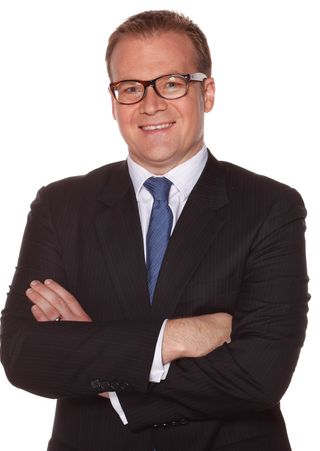ABC The Drum
Whether Jeb Bush is running for president out of obligation or conviction is beside the point for some conservatives — for them the question is whether they are in danger of being "fooled" by a Bush for the third time, writes
In American politics, having the last name "Bush" carries with it more baggage than an A380.
Sure, there are decades of political friendships and favours to call on, and the kind of contact list that can only come from having one Bush or another spending 20 of the past 34 years in the White House as president or vice-president. But for every satisfied voter — for every donor who landed a drilling license, tax break, government contract or diplomatic posting — there are others who feel very let down by the Bushes.
Many conservatives lost faith in George Bush Sr, who, after famously declaring "Read my lips: no new taxes" while campaigning in 1988, turned around as president in 1990 and brokered a budget deal with congress that imposed new taxes. And George W Bush may have satisfied foreign policy hawks by invading Afghanistan and Iraq in response to the 9/11 attacks, but he appalled deficit hawks by paying for those wars on America's national credit card rather than cutting spending in other areas.
Republicans could be forgiven for thinking back to the immortal words of the second President Bush: "Fool me once, shame on you... you fool me, you can't get fooled again."
Quite.
The backflip on taxes by George HW Bush gave rise to the powerful, absolutist lobby group Americans for Tax Reform (ATR) headed by the influential Grover Norquist. The group has signed a huge number of Republican candidates and office holders since the early 1990s to a "Taxpayer Protection Pledge" also known as the "No New Taxes Pledge". That one document has arguably done more to bring budget gridlock to Washington DC than anything else.
And the policies of "W" can be credited with giving rise to the other major conservative roadblock to emerge in recent years, the libertarian-infused TEA (Taxed Enough Already) movement, which combines a Norquist-like zeal for small government with an almost leftist anti-war, personal freedom agenda.
Don't think for a minute that either ATR or the TEA party will be welcoming the presidential candidacy of yet another Bush.
And then there's the candidate himself. Already, in his "exploratory" campaign phase, Jeb has been tripped up by questions about his brother's invasion of Iraq in 2003. It's a question he must have seen coming for about, well, 12 years: Would Jeb, knowing what we know now about there being no weapons of mass destruction, have invaded Iraq?
"I would have, and so would have Hillary Clinton, just to remind everybody and so would have almost everybody that was confronted with the intelligence they got," Governor Bush told Fox News on May 11.
So, that was a yes then. Jeb Bush was backing big brother to the hilt, even knowing what we know now — the hundreds of thousands of lives lost, the continued regional instability, the hornet's nest of sectarian violence.
Then three days later the governor walked back from his earlier comments:
So here's the deal: If we're all supposed to answer hypothetical questions, knowing what we know now, what would you have done? I would have not engaged — I would not have gone into Iraq.
Oh, so that's a no then?
Yes... it was a no.
Perhaps it was nothing more than a slight stumble on the way to the starting line, but it was such an obvious question, OBVIOUS. It suggests a lack of preparation at best, or a lack of belief in what he was saying — maybe he has truly mixed feelings, pangs of family loyalty in the face of overwhelming evidence that W stuffed up.
It brings to mind another fumble from another heir to a political dynasty: when Senator Ted Kennedy flubbed a softball question from CBS TV interviewer Roger Mudd before the start of his long-anticipated presidential run in 1979.
"Why do you want to be President?" Mudd asked innocuously.
Ted Kennedy paused. Ted Kennedy blinked.
"Well I'm... errr..." he began. "... ahh... were I to make the... err... the announcement... and err... to run ... the reasons that I would run is ... because I have a great belief in this country ... that is... there is more natural resources in this country than any nation in the world ..."
He wants to be president because America has natural resources? Huh.
To some observers, Kennedy's halting, inarticulate answer betrayed the real truth — he had mixed feelings about a run for the office which one brother was murdered holding and a second was killed pursuing. Did he want the scrutiny of every scandal, the dead girl in the car... the pills... the booze... the other girls.
Kennedy's campaign manager Bob Shrum gives a simpler explanation: well of course Teddy wasn't about to confirm he was running to Roger Mudd, and was choosing his words carefully in what he knew was a pre-recorded interview.
Would the real answer for Teddy have been "I'm running for President because everyone expects me to"? Would Jeb's answer be the same to the "Mudd question" now?
Maybe.
George W Bush was at least in part motivated to seek the presidency by the belief his father had been robbed of a second term in 1992 by conservative Pat Buchanan who opposed the tax hikes and challenged him for the nomination.
It could be that Jeb simply wants to be the "compassionate conservative" president his older brother said he'd be before the world changed on 9/11, or even the sort of unfashionably moderate, pragmatic Republican leader his father was.
For some conservatives the question will be: are they in danger of being "fooled" by a Bush for the third time?
This article was originally published at ABC The Drum





